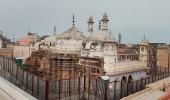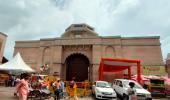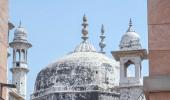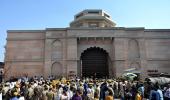The Archeological Survey of India (ASI) on Wednesday urged a Varanasi court not to make its Gyanvapi mosque complex survey report public for at least four more weeks, according to the lawyer for the Hindu side.

Varanasi district court judge A K Vishvesh then adjourned the matter till Thursday, Hindu side counsel Madan Mohan Yadav said.
According to the lawyer, the ASI requested the court for four more weeks before the sealed survey report is opened.
The ASI submitted its survey report to the district court in a sealed cover on December 18.
Yadav said the ASI referred to a recent judgment of the Allahabad high court while seeking four weeks' time.
The Allahabad high court had on December 19 dismissed several pleas from Muslim sides challenging the maintainability of a suit seeking restoration of the temple where the Gyanvapi mosque now stands in Varanasi.
In its observation, Justice Rohit Ranjan Agarwal had said the Places of Worship (Special Provisions) Act, 1991 did not define religious character and this can only be determined through evidence presented in the court by opposing parties.
Either the Gyanvapi compound has a Hindu religious character or a Muslim religious character. It can't have dual character at the same time, the judge had said.
"The trial in this case of vital national importance should be concluded as soon as possible, preferably within six months. If required, the lower court may direct ASI for a further survey," the HC had observed.
Following the district court's order on July 21, the ASI carried out the scientific survey of the Gyanvapi premises, located next to the Kashi Vishwanath temple in Varanasi in Uttar Pradesh, to determine whether the mosque was constructed over a pre-existing structure of a Hindu temple.
The survey was ordered by the court after the petitioners claimed the 17th-century mosque was constructed over a pre-existing temple.
During the hearing in the district court on Wednesday, the Hindu side referred to its application to the Supreme Court seeking permission for cleaning the mosque's 'wazu khana' (used by people for ritual ablutions before offering namaaz) as several fish have died there.
The Muslim side raised objection to this and said the 'wazu khana' is their property and they should be given the responsibility to clean it.
The Hindu side told the district court that the 'wazu khana' was sealed on the orders of the Supreme Court.
The Hindu side also said that it should be cleaned either by them or the administration.
The court would decide on this matter also on Thursday.











 © 2025
© 2025